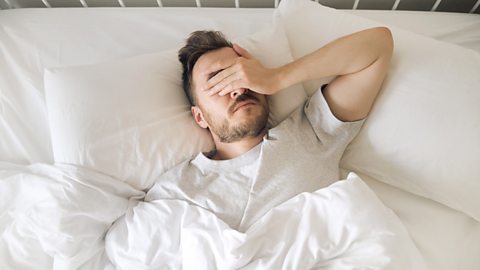Key points
- Recreational drugs have serious effects on behaviour and health.
- Some recreational drugs are illegal and others are legal.
Video
The effects of recreational drugs
Recreational drugs can be classified as depressants, those that supress and slow down messages in the brain and along the nerves, or stimulants, those that excite or speed up messages in the brain and along the nerves.
Alcohol, found in beer, wine and spirits, is a depressant. Like many depressants, alcohol can lower inhibitions and slow reaction times. It can also cause serious damage to the liver, brain and heart.
Nicotine, found in tobacco that's smoked, and caffeine, found in cola, coffee and tea, are both stimulants. They increase alertness, attention and energy, but in excess they cause damage to the liver and heart. And smoking tobacco causes serious damage to the lungs.
The effects of stimulants and depressants, and the damage they can cause, is often difficult to gauge, and they should always be treated with caution.
Drugs
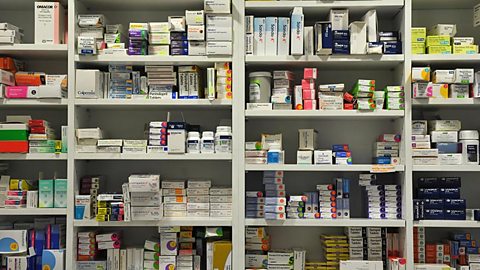
A drug is a substance that has an effect on the body.
- medicinesDrugs that help people suffering from medical conditions, which are usually prescribed by a doctor. are drugs that help people suffering from pain or disease.
- recreational drugsDrugs taken because of how they make people feel, rather than because there is a medical need. are taken by people because they like the effects they have on their bodies.
Some recreational drugs are legal, such as tobacco and alcohol. However, there are restrictions on who can buy them. Caffeine, found in coffee, is another recreational drug. Most other recreational drugs are illegal, and these include cannabis, ecstasy and heroin. Some medicines are misused and taken for recreational use, rather than for medical reasons. They become illegal under these circumstances.
Illegal drugs are classified from Class A to Class C. Class A drugs are most dangerous, with the most serious penalties for possession or dealing. Class C drugs are the least dangerous, with the lightest penalties, but this does not mean they are safe to take. Most recreational drugs can be addictiveSomething that is addictive is habit-forming. It creates a dependency so that more of it is wanted.
Any drug that is misused can cause damage to the body, as well as personal and social problems. Injecting any drug with a needle and syringe that someone else has used may lead to a number of diseases from infected blood.
Recreational drugs can often be classified as depressantsDrugs that slow down the nervous system, often making reactions slower. or stimulantsDrugs that speed up the nervous system, often making reactions faster..

Depressants
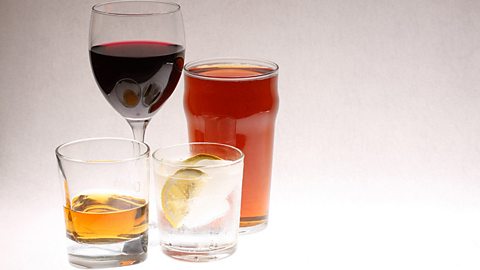
A depressant slows down messages in the nervous system, which includes the brain, spinal cord and other nerves. This often makes you feel less alert and lengthens reaction times. Alcohol is an example of a legal depressant for adults over 18. Alcohol is found in beer, wines and spirits such as vodka.
Heroin is an example of an illegal depressant. Some solvents and gases, such as glue and aerosols, can act as dangerous depressants if inhaled. If used as a drug, they cause liver damage, brain damage and death. It is illegal to sell these solvents and gases to someone who is likely to inhale them.
The effects of drugs can vary for different people. However, here are some of the typical effects depressants have on the body:
- lowered inhibitionsNatural feelings that stop or slow us doing something.
- slowed thinking and activity
- a distorted view of the world, or hallucinationsSeeing, hearing or feeling things that are not really there.
Some of the long-term effects of depressants on the body include damage to the liver, brain and heart. They can also have the following effects:
- Solvent abuse causes a rash around the nose and mouth.
- Being under the influence of some depressants causes careless or silly behaviour which can result in harm to the person or those around them.
- Some depressants cause loss of memory and concentration, as well as an increased risk of mental health issues.

Stimulants
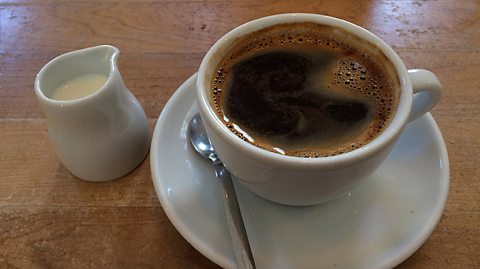
Stimulants speed up messages in the nervous system. This makes you feel more alert and shortens reaction times. Nicotine from tobacco is a stimulant. Caffeine is another stimulant and is found in energy drinks, coffee and tea. Both of these make you feel more energetic and alert, but they can also cause headaches, nervousness and difficulty sleeping.
Cocaine, ecstasy and amphetamines are all illegal stimulants. They make you feel more energetic and confident, but they can damage the liver and heart. They can also cause loss of memory and concentration, and bring an increased risk of mental health issues.

Smoking
Nicotine is the most addictive drug in tobacco. It is found in both cigarettes and some e-cigarettes/vapes. The nicotine from smoking cigarettes or vaping causes the person to want more. Nicotine also increases heart rate and blood pressure, and makes blood vesselsVeins, arteries and capillaries which carry blood around your body. narrower than normal. This can lead to heart diseaseA range of medical conditions including heart attacks, faulty valves and irregular heartbeats. .
As well as nicotine, tobacco contains hundreds of other chemicals. Tar causes cancerA disease caused by normal cells changing so that they grow and divide in an uncontrolled way. The uncontrolled growth causes a lump called a tumour to form. of the lungs, mouth and throat. It coats the inside of the lungs, including the alveoli, causing coughing and damages the alveoli, making it more difficult for gas exchange to happen.
Cells in the lining of the gas exchange systemThe lungs and airways - including trachea, bronchi and bronchioles - that exchange oxygen in air for carbon dioxide. produce sticky mucus. This traps dirt and microbes. Cells with tiny hair-like parts, called cilia, then move the mucus out of the lungs. However, hot smoke and tar from smoking damages the cilia. As a result of this, smokers cough to move mucus and are more likely to get bronchitis.
There are are-restrictions on who can buy tobacco and vape products and where they can be used.
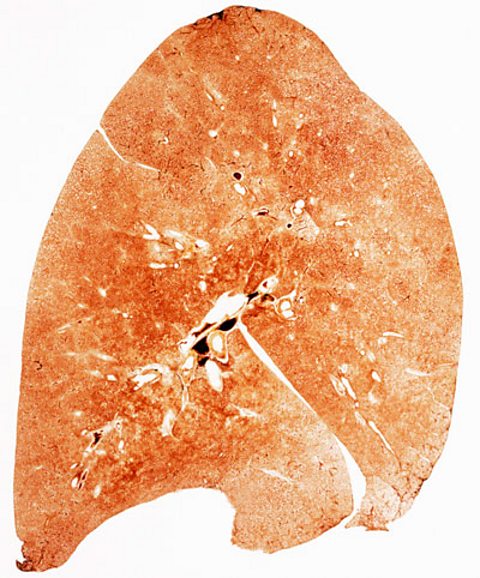
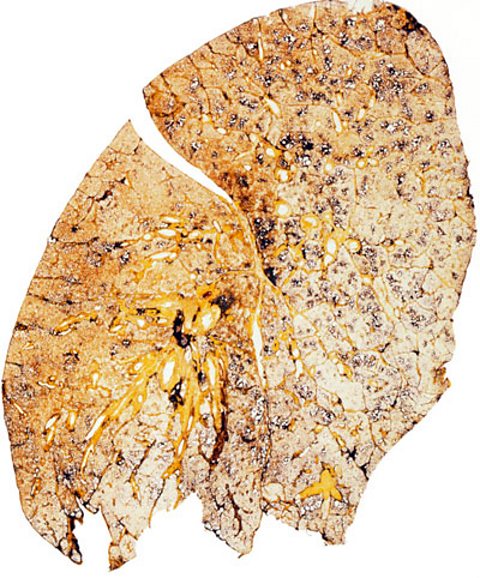
Painkillers
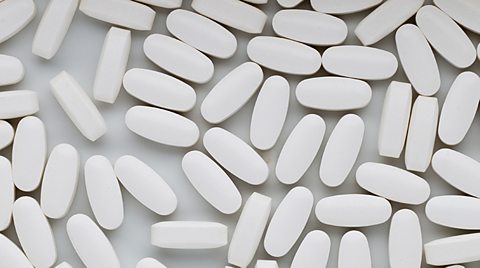
Painkillers are chemicals that relieve the symptoms but do not kill the pathogen. Common examples include paracetamol and aspirin, which can relieve a headache or a sore throat. Even though the pain is treated, the cause of the pain often still needs treatment. All drugs that are used as medicine, including painkillers, need to be taken according to their instructions, as incorrect use can lead to serious harm.

Drugs and their effects
| Drug | Type | Legality | Effects on behaviour | Effect on health |
|---|---|---|---|---|
| Alcohol | Depressant | Legal (for over-18s) | Slows thinking | Short term effects include hangovers, while long term effects include liver disease |
| Caffeine | Stimulant | Legal | Alert, and if too much taken then nervousness and restlessness | Too much causes lack of sleep |
| Paracetamol | Painkiller | Legal | None | Reduces pain without addressing the cause |
Test your knowledge
Quiz
Test questions
Write a short paragraph to answer the following questions. Tap 'Show answer' to see seven points you could have included.
Describe the effects of depressants, giving examples in you answer.
- Depressants slow down messages in the nervous system.
- This lengthens reaction times making reactions slower.
- Alcohol is a legal depressant.
- Heroin is an illegal depressant.
- Solvents are also illegal depressants.
- Depressants can lower inhibitions.
- Some depressants can increase the risk of mental health issues.
Describe the effects of stimulants, giving examples in your answer.
- Stimulants speed up messages in the nervous system.
- This shortens reaction times making reactions faster.
- Caffeine is a legal stimulant.
- Cocaine is an illegal stimulant.
- Ecstasy and amphetamines are other illegal stimulants.
- Stimulants make you feel more energetic and alert.
- Stimulants can also cause loss of memory and concentration, and bring an increased risk of mental health issues.
Working safely in the lab
Find out how to spot risks, hazards and understand hazard symbols

More on Health and disease
Find out more by working through a topic
- count2 of 5
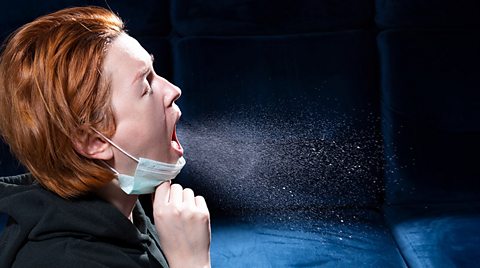
- count3 of 5
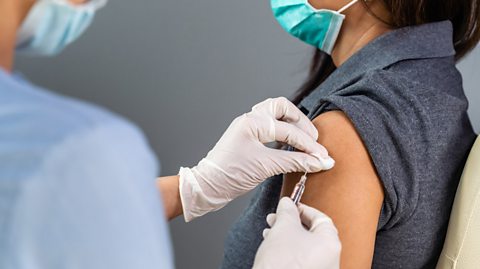
- count4 of 5
